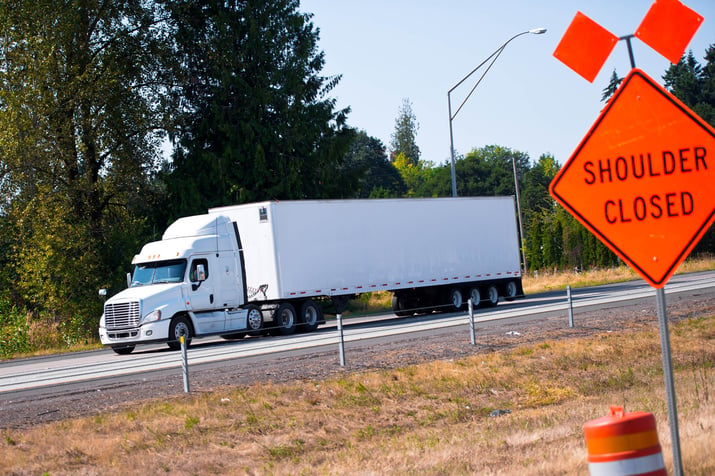Congestion, Construction among Spring Driving Hazards

Spring has returned for most of the country, which means operations staff should take time to remind drivers of the seasonal risks that come with this time of year. Read about the spring-related driving hazards below and commit to completing the “Call to Action” items at the bottom of the page.
ADVERSE WEATHER
Spring marks the beginning of warmer temperatures and some of the country’s most dangerous weather systems. Drivers must contend with severe weather hazards, such as thunderstorms, high winds, tornadoes, and flooding. To help protect drivers, operations staff should monitor weather forecasts and communicate these hazards to drivers. If conditions are safe to continue, remind drivers to slow down and increase their following distance to allow more time to stop in the slippery conditions. If conditions become unsafe, encourage drivers to find a safe place to pull over and wait for the storm to pass.
DANGEROUS ROAD CONDITIONS
Melting snow and ice, as well as rain, make road conditions slippery. Operations staff should allow drivers to take their time and be extra cautious in adverse driving conditions. Likewise, remind drivers to conduct pre-trip inspections to ensure their vehicles are operating safely, especially brakes and tires. Also, potholes can wreak havoc on equipment. Popping a tire could lead to a loss of control crash and possibly a high-dollar loss. Remind drivers to avoid distractions, like talking or texting on the phone, and be attentive to the road ahead. If a hazard presents itself, advise drivers to react properly, such as by slowing down and staying in one lane.
TRAFFIC CONGESTION
As the temperatures heat up, people will be looking to get outside and enjoy the weather. Springtime brings increased traffic and more cars, motorcycles, and bicycles on or around the roadways. These factors create additional hazards for drivers to track. Likewise, slow-moving farm equipment can make passing difficult on rural roads and add to a driver’s stress. Remind drivers to stay extra vigilant and yield the right of way to others. If driving is becoming too stressful, always remind drivers it is better to pull over in a safe place and refocus than letting their emotions boil over into aggressive driving or road rage.
ROAD CONSTRUCTION
Road construction is inevitable, but operations staff can help drivers by rerouting them away from construction areas. If a delay occurs, call the receiver on the driver’s behalf to let them know your driver is running behind due to construction traffic and is on the way. This act of kindness will help alleviate your driver’s stress so he/she can remain focused on driving. Also, remind drivers to slow down below the posted speed limit in construction zones and maintain proper following distance. Workers and equipment may enter the roadway unexpectedly, so drivers should avoid distractions and stay focused on the road ahead.
CALL TO ACTION
-
Communicate adverse weather conditions and road construction areas to drivers.
-
Call the shipper/receiver on the driver’s behalf to pass along any delays.
-
Remind every driver to conduct a thorough pre-trip vehicle inspection before driving.
Note: These lists are not intended to be all-inclusive.
The information in this article is provided as a courtesy of Great West Casualty Company and is part of the Value-Driven® Company program. Value-Driven Company was created to help educate and inform insureds so they can make better decisions, build a culture that values safety, and manage risk more effectively. To see what additional resources Great West Casualty Company can provide for its insureds, please contact your safety representative, or click below to find an agent.
© Great West Casualty Company 2020. The material in this publication is the property of Great West Casualty Company unless otherwise noted and may not be reproduced without its written consent by any person other than a current insured of Great West Casualty Company for business purposes. Insured should attribute use as follows: “© Great West Casualty Company 2020. Used with permission by Great West Casualty Company.”
This material is intended to be a broad overview of the subject matter and is provided for informational purposes only. Great West Casualty Company does not provide legal advice to its insureds, nor does it advise insureds on employment-related issues. Therefore, the subject matter is not intended to serve as legal or employment advice for any issue(s) that may arise in the operations of its insureds. Legal advice should always be sought from the insured’s legal counsel. Great West Casualty Company shall have neither liability nor responsibility to any person or entity with respect to any loss, action, or inaction alleged to be caused directly or indirectly as a result of the information contained herein.




